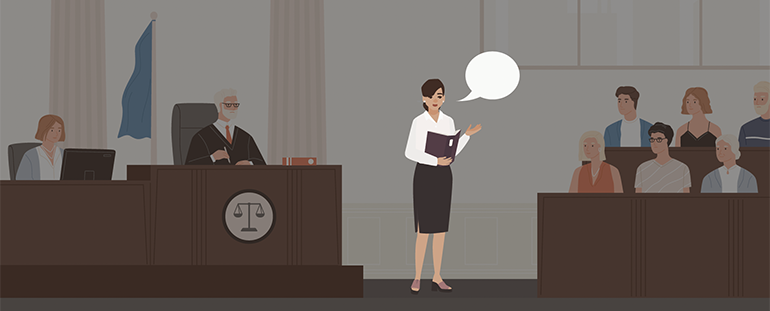
By Sarah Brite Evans
About 10 years ago, someone asked my then-toddler son if he wanted to be a lawyer when he grew up. “No,” I remember him defiantly saying. “That’s a girl job!” Obviously, he and I have had a series of discussions about gender roles since, but at this mid-point in my career, I recognize that finding my voice in this “girl job” has been an ongoing project involving many different people.
Finding my voice as a female litigator was made easier by the work of many others before I started. The talented and strong women litigators who came before me had to face oppressive stereotypes and biases, and so many persevered. I have never felt that my gender alone held me back from or dictated any of my professional goals. I thank and celebrate those who overcame hurdles and helped knock them down for me, which made finding my voice much easier.
Since law school, mentors and role models have shown me how to become myself and become comfortable with my own voice. Ironically, two of the earliest role models for me on this were both male — Mike Kirby and Dave Noonan, my first bosses. They could not have more different styles in every aspect of their practice, but for several years, I had a front-row seat, watching each be successful in his own way. This gave me great confidence that if I found my own voice and style, I would also find success.
So, I started to explore, test, and experiment with what I could do to become the litigator that works best for me. In San Diego, there are many wonderful female litigators, too many to list here, who have been amazing role models for me. Not only do I admire them, but when given the chance to watch them in action, I did. I worked to analyze their successful traits and habits and identify what strategies they utilized in different situations. Often, I focused on how they exuded confidence in court or a conference room and captivated and persuaded listeners. I learned a lot by watching them work their magic. And I scavenged, er, I mean, I tried to adopt many aspects that I saw these women model for me.
Importantly, one way that I was able to find myvoice as a litigator was by using it. My then-bosses and now partners (and in particular Ross Schwartz and Dick Semerdjian) gave me opportunities early on to handle matters myself — develop case strategy, work closely with our clients, take and defend depositions, and handle motions, mediations, and the occasional trial solo. Because I took advantage of these opportunities, I was able to test out some of those traits and habits I saw in my role models to find the voice that works for me.
It forced me to come up with a strategy for dealing with difficult or unique issues and situations rather than asking a more senior attorney for advice about how to deal with those challenges; this has been an important way for me to develop my voice. I certainly owe a debt of gratitude to patient colleagues who have responded “yes” when I’ve asked, “Do you have five minutes so I can run something by you?” I have appreciated their frankness and criticism on a number of my initial strategies, as it has steered me to becoming a better litigator, making better decisions and developing more confidence in each, too. By initially strategizing myself then factoring in wise insight from others when necessary, I find that I speak with a confident voice.
Moreover, having friends with whom to discuss professional and personal life has been invaluable to helping me find my voice as a female professional in general. Navigating firm life, business development, community involvement, and incorporating parenthood into this career are shared struggles for many of us. Having close friends with whom I can discuss the struggles and also the successes continues to help me find my voice in each newphase of life.
My path to finding my voice would not have been possible without the brave efforts of those before me, amazing examples from role models in our community, invaluable professional development opportunities provided by my firm, and cheerleading from friends. I must also give credit to the women behind the scenes who make it possible for me to have a voice as a litigator. Most office support staff members are female.
They answer phones, welcome clients, file and serve pleadings, and so much more to keep the office running. Court reporters and court staff are also predominantly female, and they keep the engines of our litigation process humming. My voice would be a lot quieter without their assistance.
My voice would also be much quieter without support at home. I could not stay late when a deposition or mediation runs long or make it to Los Angeles in time for an early morning court hearing without our wonderful nanny. Most child care is provided by women — either a partner who stays at home or child care providers and schools — and I am free to be a litigator because I have confidence that my kids are taken care of at home and school.
So, when we celebrate women, I celebrate those who came before, those who I have learned from, those who gave me opportunities to use my voice, and those who make it easier every day for me to use it in this so-called “girl job.”
Sarah Brite Evans (sarah@sscmlegal.com) is an employment law partner at Schwartz Semerdjian.